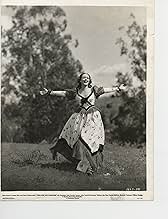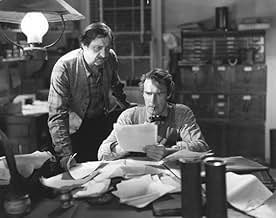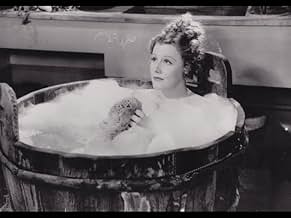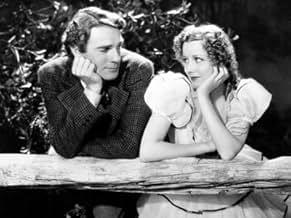Adicionar um enredo no seu idiomaPennsylvania, 1859. Railroad tycoon Brennan (Alan Hale) is muscling in on oil-drilling farmers, led by Peter Cortland (Randolph Scott). Cortland must try to save their oil business, while al... Ler tudoPennsylvania, 1859. Railroad tycoon Brennan (Alan Hale) is muscling in on oil-drilling farmers, led by Peter Cortland (Randolph Scott). Cortland must try to save their oil business, while also saving his marriage to Sally (Irene Dunne).Pennsylvania, 1859. Railroad tycoon Brennan (Alan Hale) is muscling in on oil-drilling farmers, led by Peter Cortland (Randolph Scott). Cortland must try to save their oil business, while also saving his marriage to Sally (Irene Dunne).
- Direção
- Roteiristas
- Artistas
- Student
- (não creditado)
- Direção
- Roteiristas
- Elenco e equipe completos
- Produção, bilheteria e muito mais no IMDbPro
Avaliações em destaque
For reasons I don't understand, except for Showboat she was not given a singing leading man. The story lines were rewritten to give her all the good songs and the leading man none. Not that Donald Woods in Sweet Adeline or Douglas Fairbanks, Jr. in Joy of Living or Randolph Scott in Roberta and High Wide and Handsome had any ambitions to sing, but it might have been nice to have her teamed with someone like Allan Jones again as she was in Showboat.
High Wide and Handsome is set in western Pennsylvania just after Edwin L. Drake invented the first practical oil derrick to drill for the stuff. Up to that time oil was considered a nuisance at best, a positive calamity at worst for some poor farmer who had the stuff oozing through to his soil. Randolph Scott is such a farmer who has the idea of marketing for heating fuel.
Others agree with him including Alan Hale who is in a part normally reserved for Edward Arnold. He's the boss of the railroad and who would be shipping the stuff and at the rate he determines, but him only.
Not beaten Scott conceives the idea of the first oil pipeline and then its a fight to the finish with the Hale and the railroad. By the way in real life this is how John D. Rockefeller cornered the oil market and gave the Rockefeller family the wealth it enjoys today.
Irene Dunne is in a medicine show that breaks down and she, Raymond Walburn and William Frawley are given shelter by Scott and his grandmother Elizabeth Patterson. Of course the usual boy/girl stuff happens.
Scott's an earnest of guy, but a bit of a prude as well. Later on when Dunne aids another entertainer in trouble, Dorothy Lamour, Scott and she break up when he finds the two of them trying to put over an act in a saloon to get her hired.
Two very big songs for Jerome Kern and Oscar Hammerstein, II came out of High Wide and Handsome both sung by Dunne, Can I Forget You and The Folks Who Live On The Hill. Again this was a case of one hand washing the other as Paramount no doubt convinced the leading singer in America who by no coincidence was a Paramount contact player to record them and plug them on his radio show. Bing Crosby's records of them are classic and they sold a few platters back in the day. In fact why didn't they have Bing in this film? It certainly had more of a budget than the musicals Paramount was giving him.
Other villains in High Wide and Handsome are Charles Bickford and Irving Pichel. Bickford is just a plug ugly who does Hale's dirty work and probably would pay Hale to do it for him as he and Scott hate each other and that's made clear right at the beginning of the film. Irving Pichel plays a strange Puritan type individual, self appointed keeper of the community morals. His was a strangely underdeveloped character in the script that Oscar Hammerstein, II wrote.
Rouben Mamoulian who directed his fair share of musicals on screen and on the stage did a good job with his cast. And you can never go wrong listening and singing Jerome Kern's wonderful songs.
The story is an unusual one because it's about the nation's first oil wells which were created in Western Pennsylvania in 1859. It begins just before this and a medicine show arrives in town. After a freak fire breaks out and leaves the show stranded, some of the locals take in the medicine show folk. One of them is Sally (Irene Dunne) and soon she is in love with the son of the old lady who took her into her home. As for Peter (Randolph Scott), he looks like a perfect catch for Sally...but little does she know that he's about to strike oil and the oil business would dominate their marrage and sour it as well.
In many ways, this reminded me of the later MGM film "Boom Town", as it's also about the oil business as well as its negative impact on a new marriage. Both are worth seeing, but I'd prefer "Boom Town" simply because it lacks the pointless songs of "High, Wide and Handsome"....none of which are memorable and just seem unnecessary.
Overall, worth seeing IF you don't mind the songs. The finale is pretty neat and the acting quite good.
Paramount obviously had high hopes for this movie, assigning Rouben Mamoulian to direct and cinematographers Vic Milner and Theodore Sparkuhl to supervise the cameras. The cast is likewise excellent: Dorothy Lamour, Raymond Walburn, William Frawley, Charles Bickford, and Akim Tamiroff are just two of the actors adding their talents to the spectacle.
Unhappily, the score is not among the best of the Hammerstein-Kern efforts. Other reviewers have expressed their admiration for Miss Dunne's rendition of the sentimental "The Folks Who Live on the Hill." I prefer Frawley's "Will You Marry Me Tomorrow, Maria?", but there isn't much to it, and and old-fashioned orchestration -- suitable for the 1860 setting -- makes the songs unmemorable.
What's left is the "little guys against greedy capitalists", and there are some beautifully shot sequences, especially when the circus (complete with elephants) comes to the rescue of the men building the pipeline. Yet while the camerawork makes the movie always engaging, the tired story and bad score limit it to that.
The story begins with Sally Watterson (Irene Dunne), a young girl traveling with her medicine sideshow father named "Doc" (Raymond Walburn), singing the title song as they settle in a western Pennsylvania town. As "Doc" tries selling some medicine bottles to his patrons, which proves to be a fraud by spectator Peter Cortlandt (Randolph Scott), a fight ensues amongst the crowd, damaging their wagon. Being given the hospitality of her home by Peter's grandmother (Elizabeth Patterson), the stranded Sally earns her keep by helping with the farm animals, and soon gets to know and love Peter, a rugged oil prospector, whom she eventually marries. Their marriage, at first, is a happy union, until Peter neglects his wife in favor of keeping his promise with the neighboring farmers by banding together in laying oil pipelines in order to prevent Red Scanlon (Charles Bickford), a corrupt railroad president, from monopolizing the industry. After Sally is found entertaining on top of the table in the barroom with Molly (Dorothy Lamour), a saloon girl she and Peter had earlier rescued from a lynch mob, the couple find themselves in an argument which sends Sally to leave her husband and return to life entertaining in the passing circus show and to her father, while Peter tries to fulfill his pipeline dream, which, at the present time, proves to be more important than trying to find Sally and resolve matters. The elaborate and well staged sequence with thousands of prospectors racing against time to get the gigantic oil pipeline finished on schedule is almost similar to King Vidor's conclusion of OUR DAILY BREAD (1934) where the farmhands are seen rushing to ditch a waterway in order to save their dying crops, but with this production, an added bonus of rugged fighting scenes and one near miss scene adding to the suspense in which the unconscious Scott is nearly crushed by a falling pipe that lands inches from his head. Whew!
Almost forgotten today and rarely seen in recent years, HIGH, WIDE AND HANDSOME has its share of good tunes, with music and lyrics by Oscar Hammerstein II and Jerome Kern, including: "High, Wide and Handsome," "The Simple Maiden," "Can I Forget You?" (all sung by Irene Dunne); "Will You Marry Me Tomorrow, Maria?" (sung by William Frawley); "The Folks Who Live on the Hill" (sung by Irene Dunne); "The Things I Want" (sung by Dorothy Lamour); "Allegheny Al" (sung by Dunne and Lamour) and "Can I Forget You?" (reprise by Dunne). Of the songs, "The Folks Who Live on the Hill," sung by Irene Dunne wearing her old-fashioned wedding gown, comes off best and memorably, as she sings it to her new husband, Peter (Scott) after showing her the dwelling they are to live. Another memorable moment is seeing William Frawley (years before his "I Love Lucy" TV series days in the 1950s) in full voice singing "Will You Marry Me Tomorrow" during a ceremony. While Irene Dunne is no Jeanette MacDonald or Grace Moore when it comes to vocalizing, many forget how well she singing delivery is, and she does it quite well, but unfortunately, on the whole, the songs did not become as immortal as the other Hammerstein and Kern scores.
In the supporting cast are Alan Hale as Walt Brennan, the head of the transportation syndicate; Akim Tamiroff as the foreign gambler, Joe Varese; Irving Pichel as Mr. Stark; Lucien Littlefield, Purnell B. Pratt, and some light "comedy relief" supplied by Ben Blue playing Zeke, a hired hand. Raymond Walburn, a fine character actor appearing here as Irene Dunne's father, performs his task well, almost as if this role were intended with W.C. Fields in mind, especially with similarities in his medicine show man who tries to defraud his public with phony medicine bottles, etc.
Running ten minutes short of two hours, HIGH, WIDE AND HANDSOME is entertaining, quite original for its time, but sadly, a neglected item. A lot of effort went into this nostalgic production, and it shows. The only thing missing, and a real oversight, is Technicolor. Around this time, Paramount produced some fine Technicolor outdoors films, notably THE TRAIL OF THE LONESOME PINE (1936) with Sylvia Sidney, and EBB TIDE (1937) with Frances Farmer. How cinematic this handsome film would have looked in color. But overlooking this minor flaw, it's a movie worth seeing through once, and after its THE END title and list of actors and their roles (and underscoring to "The Folks Who Live on the Hill") before the final fadeout, it may make one wonder why this is among the rarely-seen western-type musicals gems (even with Turner Classic Movies showing August 16, 2019) from the "golden age of Hollywood" period. (***1/2)
Você sabia?
- CuriosidadesAccording to Margaret J. Bailey's book on Hollywood costume design of the 1930's, "Those Glorious Glamour Years," apple trees in blossom were required for some scenes. Frost in California had decimated the apple trees, so studio technicians at Paramount Studios worked overnight, peeling rosebuds down and sticking them on bare trees with maple syrup to simulate an apple orchard in full blossom.
- Citações
Mac: I'll bet Sally will be glad to get away from here.
Doc Watterson: You think so, Mac?
Mac: Sure. She's always fightin' with that Cortlandt fella. She hates the sight of him.
Doc Watterson: You know human nature, don't you Mac?
Mac: From A to Z.
Doc Watterson: You must have skipped W. The women come under W.
Principais escolhas
- How long is High, Wide and Handsome?Fornecido pela Alexa
Detalhes
- Data de lançamento
- País de origem
- Idioma
- Também conhecido como
- High, Wide and Handsome
- Locações de filme
- Empresa de produção
- Consulte mais créditos da empresa na IMDbPro
Bilheteria
- Orçamento
- US$ 1.900.000 (estimativa)
- Tempo de duração1 hora 50 minutos
- Cor
- Proporção
- 1.37 : 1





































